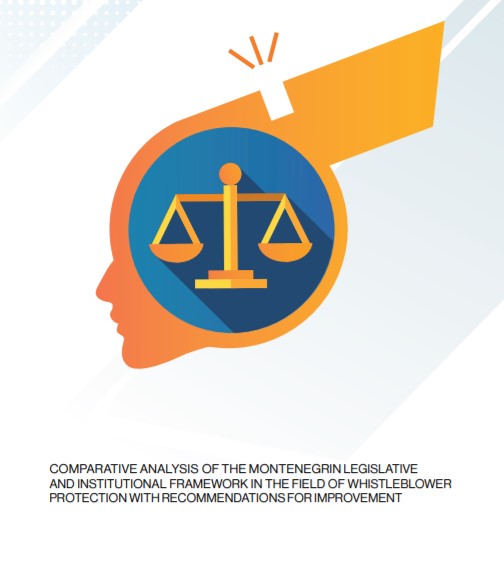Reports from Transparency International, as well as other organizations, indicate that corruption is the most prominent problem in the whole of Europe. Within the general democratic processes in Montenegro, which include changes in the political, economic and legislative system, the fight against corruption represents a significant part.
Under Chapter 23 - Justice and Fundamental Rights, in addition to establishing an independent and efficient judiciary and protection of human rights, special attention has been paid to the fight against corruption. Namely, the reduction of this social scourge is a precondition for the stability of a democratic society and the rule of law. In order to achieve this goal, the European Union, above all, emphasizes the existence of a solid legislative framework and its consistent implementation.
Whistleblowers are certainly one of the most important mechanisms for fighting corruption.
The Agency for Prevention of Corruption, as the central anti-corruption body in Montenegro, started operating in 2016, with the entry into force of the Law on Prevention of Corruption. The implementation period of more than five years and 8 months enables the legal solutions to be adequately reviewed and improved in accordance with good practices, international standards and, especially, the EU Directive on the protection of whistleblowers from 2019.
The aim of this publication is to support the Ministry of Justice, Human and Minority Rights and Agency for the Prevention of Corruption in finding adequate and expedient solutions for improving the legal framework in the field of whistleblower protection. In this regard, the target groups of the publication are legal practitioners who deal with the analysis and preparation of amendments to legal solutions, as well as the practical application of the legal framework in the field of whistleblower protection.
From a methodological point of view, the publication initially defines the term “whistleblower” and related terms, after which international instruments in this area were presented, with a special focus on standards of: United Nations, the Council of Europe and the European Union. Having in mind the similar legal heritage of the countries in the region, the legal framework for the protection of whistleblowers in certain countries of the region—the Republic of Slovenia, the Republic of Croatia and the Republic of Serbia—is especially treated. Within a special chapter, the legal framework of Montenegro in this area was presented, with an additional focus on the results of the work of the key anti-corruption body in charge of reporting and protection of whistleblowers in Montenegro. All of the above resulted in a separate chapter at the end of the publication, which contains concrete recommendations for improving the situation in this area, with an emphasis on the necessary amendments to the legislative framework.
